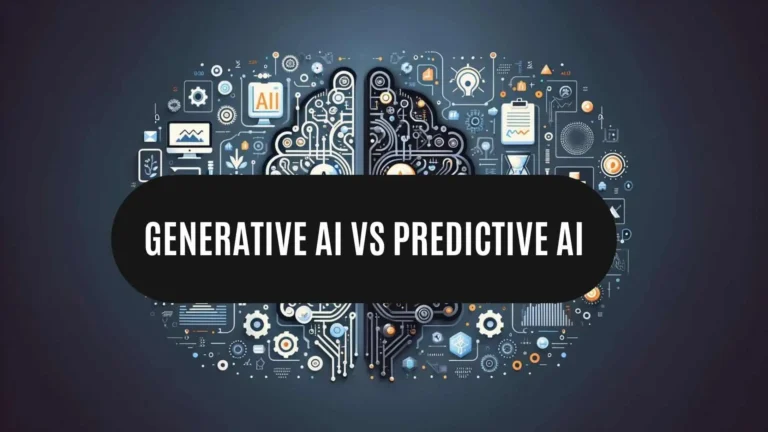AI in Healthcare: Innovations and Future Trends
In the ever-evolving landscape of healthcare, a new player has emerged on the scene – Artificial Intelligence (AI). This transformative technology is not just a fleeting trend; it’s here to stay, reshaping our health systems in ways we could only dream of a few years ago.

From predicting patient outcomes and personalizing treatment plans to automating administrative tasks, AI is revolutionizing every corner of the healthcare sector. But this is just the beginning. As we stand on the brink of a new era, the future holds even more exciting possibilities.
In this article, we will delve into the innovative applications of AI in healthcare and explore the trends that are set to shape the future. So, whether you’re a healthcare professional, a tech enthusiast, or simply curious about the future of healthcare, join us as we embark on this fascinating journey into the world of AI.
Consider reading: AI in Agriculture
Key Takeaways for AI in Healthcare
- AI technology is revolutionizing the healthcare industry by enhancing patient care and streamlining medical processes.
- Applications of AI in healthcare include disease diagnosis, personalized medicine, robot-assisted surgery, clinical workflow optimization, and medical imaging analysis.
- Benefits of AI in healthcare include enhancing diagnostic accuracy, improving treatment efficacy, and optimizing clinical operations.
- Challenges and ethical considerations in AI implementation involve data privacy, bias in algorithms, regulatory compliance, and seamless integration with existing systems.
- AI in healthcare is transforming the management of chronic diseases, epidemic outbreak prediction, mental health care, and driving innovations like AI-driven robotic surgery and telemedicine expansion.
- The future of AI in healthcare will see advancements in AI-driven robotic surgery, telemedicine expansion, utilizing big data and IoT for enhanced decision-making, and the importance of data privacy, ethical AI development, and regulatory oversight.
The Evolution of AI in Healthcare
Historical Milestones
- 1950s: AI first explores medical diagnosis and patient care.
- 1970s: Expert systems like MYCIN aid in diagnosing infectious diseases.
- 1980s: Annie develops AI algorithms to interpret electrocardiograms.
- 1990s: IBM’s Watson demonstrates its potential in diagnosing medical conditions.
- 2000s: Deep learning paves the way for AI image analysis in healthcare.
- AI-powered platforms like Linus Health focus on early cognitive impairment detection.
- Viz.ai uses AI for faster detection of medical issues, improving care team response times.
- Neuroprosthetics like Neuralink by Elon Musk show potential for medical interventions.
- Skin cancer detection accuracy surpasses dermatologists using convolutional neural networks.
Being an AI enthusiast and a healthcare advocate, I see the remarkable strides AI has made in transforming the medical world. Historical milestones laid the foundation for AI in healthcare, while recent advances demonstrate its potential to revolutionize patient care.
Key Applications of AI in Healthcare
Disease Diagnosis and Prediction
- AI excels in disease diagnosis and prediction, leveraging vast datasets to identify patterns and anomalies.
- Deep learning models aid in the identification of diseases like breast cancer and colorectal cancer with high accuracy.
- AI streamlines pathological analysis of cells and tissues, enhancing screening for conditions such as colorectal or breast cancer.
Personalized Medicine
- AI plays a crucial role in Personalized Medicine by analyzing clinical data and patient outcomes.
- It assists in developing treatment protocols and drug discovery, tailoring healthcare to individual patient needs.
Robot-Assisted Surgery
- With Robot-Assisted Surgery, AI enhances precision and accuracy in surgical procedures.
- Surgeons benefit from AI assistance in complex operations, leading to improved outcomes and reduced recovery times.
Clinical Workflow Optimization
- AI optimizes clinical workflows by automating repetitive tasks and data analysis.
- It helps in predicting supply shortages and streamlining care delivery, enhancing efficiency in healthcare settings.
Medical Imaging and Diagnostics
- AI algorithms analyze medical imaging scans, aiding in diagnosis and interpretation.
- By recognizing patterns in behavior, AI improves radiograph triage and detection of abnormalities.
- AI expedites drug discovery by processing and analyzing data to identify potential compounds.
- It accelerates the research process, leading to faster development of medications.
Benefits of AI in Healthcare
Enhancing Diagnostic Accuracy
- AI boosts accuracy in disease detection.
- Radiograph triage improves with AI analysis.
- AI algorithms spot cancer at early stages.
- AI processes medical images swiftly for precise results.
Improving Treatment Efficacy
- AI aids in treatment protocol customization.
- Drug discovery is fast-tracked with AI predictions.
- Personalized medicine benefits from AI insights.
- AI recommends tailored treatments with precision.
Optimizing Clinical Operations
- Clinical workflows are streamlined with AI automation.
- Tasks are automated for efficiency.
- AI predicts and prevents supply shortages.
- Precision in robot-assisted surgeries is optimized by AI.
- AI-driven chatbots offer 24/7 patient support.
- Virtual health assistants monitor patients continuously.
- Patient engagement and treatment adherence are enhanced.
- Personalized care plans are tailored by AI.
Challenges and Ethical Considerations
Data Privacy and Security
- Proper handling and safeguarding of personal health information is crucial.
- Large amounts of sensitive patient data collected by AI systems must be protected.
- Healthcare data privacy regulations need to be updated to include information used in AI systems.
Bias and Fairness in AI Algorithms
- Ensuring AI algorithms are free from bias and promote fairness is essential.
- Training algorithms to recognize patterns accurately without skewing results unfairly.
- Bias recognition is vital to avoid perpetuating disparities in healthcare.
Regulatory and Compliance Issues
- Compliance with federal regulations is key to the successful integration of AI in healthcare.
- Existing laws and regulations must be updated to encompass AI and ML systems.
- Healthcare data regulations need to include provisions for AI technologies.
- Seamless integration of AI with current IT systems is imperative.
- Gaining physician acceptance and trust in AI technologies is a crucial aspect.
- Existing systems need to be compatible with new AI implementations.
Consider reading: Future of AI in Education
Case Studies: AI Transforming Healthcare
AI in Managing Chronic Diseases
- AI applications play a crucial role in managing chronic diseases like diabetes and heart conditions by analyzing patient data.
- Through pattern recognition, AI can identify individuals at risk of disease progression and help personalize treatment plans.
- Studies show that AI assists healthcare providers in offering better disease management, enabling proactive care interventions.
AI in Epidemic Outbreak Prediction
- AI algorithms have been pivotal in predicting epidemic outbreaks, such as viral diseases and pandemics, by analyzing population health data.
- By analyzing vast amounts of data rapidly, AI helps public health officials make informed decisions to control the spread of infectious diseases.
- Rapid response to outbreaks is enhanced through AI-driven early detection systems, aiding in containing and managing health crises effectively.
- AI tools are revolutionizing mental health care by providing support in diagnosis, treatment, and monitoring of mental health conditions.
- By analyzing behavioral patterns, AI can offer early interventions for individuals at risk of mental health issues, improving overall outcomes.
- The integration of AI in mental health services ensures timely support and personalized care plans for individuals, promoting mental well-being.
The Future of AI in Healthcare
Emerging Technologies and Innovations
- AI-driven Robotic Surgery: Advancements in AI technology are propelling robotic surgical systems like the one by Neuralink to revolutionize surgical procedures with precision and minimal invasiveness. This leads to quicker recovery times and enhanced patient outcomes.
- Telemedicine Expansion: The integration of AI in telemedicine allows for remote consultation, diagnosis, and monitoring, expanding healthcare accessibility to underserved populations.
The Role of Big Data and IoT
- Enhanced Decision-Making: Utilizing vast amounts of healthcare data, AI can identify patterns, forecast trends, and assist in making accurate diagnoses and treatment decisions, leading to personalized care plans.
- IoT-Enabled Devices: Integration of the Internet of Things enables real-time data collection from wearable devices and medical equipment, facilitating continuous patient monitoring and proactive interventions.
- Data Privacy and Security: The evolving world calls for stringent regulations to safeguard patient data privacy and security in AI-driven healthcare systems.
- Ethical AI Development: Emphasizing ethical guidelines and transparency in AI algorithms ensures unbiased decision-making and fosters trust in the technology’s application in healthcare.
- Regulatory Oversight: Collaboration between healthcare regulators and technology developers is crucial to establish frameworks that govern AI applications, ensuring patient safety and quality care delivery.
Final Thoughts on AI in Healthcare
AI in healthcare is revolutionizing the industry with cutting-edge technologies like robotic surgery and telemedicine. The future looks promising, with AI enhancing personalized care and real-time monitoring for better patient outcomes. As we investigate deeper into the potential of big data and IoT, the possibilities for improved decision-making and healthcare accessibility are endless.
But, it’s crucial to prioritize data privacy, ethical AI practices, and regulatory compliance to ensure patient safety and quality care. Embracing AI in healthcare means embracing a future where innovation and compassion intersect to redefine the standards of patient-centered care.
FAQs on AI in Healthcare
How AI is used for healthcare?
AI revolutionizes healthcare by enhancing diagnostic precision and personalizing treatment regimes. It leverages patient data for informed medical decisions and employs big data analysis for proactive preventive care strategies, ensuring a more predictive healthcare model for improved patient outcomes.
What is an example of AI in health?
An example of AI in health is a machine learning algorithm that analyzes medical images to detect early signs of diseases, such as cancer. Additionally, AI-powered chatbots can assist patients with appointment scheduling and medication reminders, enhancing healthcare accessibility and efficiency.
How is AI disrupting healthcare?
AI is revolutionizing healthcare by enhancing diagnostic precision. It analyzes large data sets—medical records, images, and lab results—more swiftly than humans, leading to faster, more accurate medical diagnoses and personalized treatment plans, thus improving patient outcomes significantly.
What is the prediction of AI in healthcare?
The future of AI in healthcare is promising, with predictions including enhanced efficiency in administrative tasks and significant cost savings. It’s anticipated that AI will revolutionize patient scheduling, streamline claims processing, and provide advanced support for clinical decisions, contributing to both improved care and reduced expenses.



